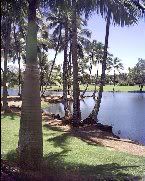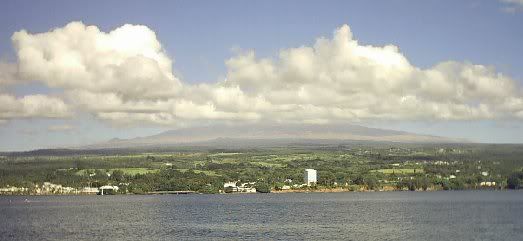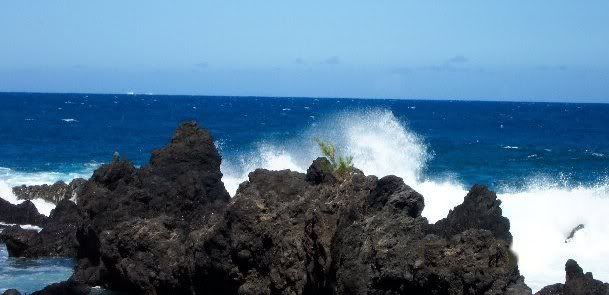December 28, 2003
Observation
I thought that this mornings message by Mrs. Elliot-Gren was particularly suited in this season of go go go, do do do...We meet Elisabeth and her husband Lars as the set off on an adventure, whale watching on the waters near their home on Cape Cod..
On a beautiful cool morning last July, Lars and I left behind all our usual work and chugged out of Gloucester harbor in Massachusetts on a fifty-foot fishing boat. There were about twenty of us aboard, all of us in high spirits until the captain announced that the marina we had just left as well as the restaurant behind it and the lobster packing plant next to it had been bought the previous day by the Reverend Sun Myung Moon. This lowered our spirits momentarily, but they soon shot up in anticipation of what we were about to see. It was not the cormorants that flocked on the tiny island at the mouth of the harbor, or the reef of Norman's Woe where the Hesperus was wrecked, or the lighthouse on Eastern Point.
We noted all of these things with interest (the oldest paint factory in the country did not rouse us much), but none of them were what we had paid our fifteen dollars apiece to see. Lars had called the week before to inquire about the advertisement. Did they guarantee anything? No, that was impossible, but in the twenty trips made so far that summer they had seen them every time. We decided it was well worth risking the price of tickets if there was even an outside chance of seeing them: whales. Not captive in Marineland, not doing tricks in the zoo, but real live full-sized unbelievable wild whales out in the open Atlantic Ocean, free-swimming, God-glorifying giants of the deep.
Our on-board whale authority turned out to be a man of about twenty wearing a T-shirt and cutoffs, with a baseball cap clamped over his long hair. He stood up in front of us with a chart and proceeded to show us pictures of "the whales we'll be seeing."
Well, I thought, he sounds wonderfully confident. Will we be so fortunate as to see even one spout in the distance? Sometime after half-past nine, he assured us, we might begin to spot them. We would understand the lookout's directions if we imagined the boat as the face of a clock, its bow representing twelve o'clock, its stern six. He then explained that the whales most likely to be in the area were the humpback and the finback, each having a characteristic "blow." Whales, being mammals, breathe air. They surface every few minutes, exhale a great column of vapor (the finback's is twenty feet tall, straight up into the air), inhale in a split second, and then dive.
They do their mating in the area of the Dominican Republic in the wintertime but eat little then. In the summertime they come north and do most of their eating off the coast of Massachusetts, occasionally going as far north as Newfoundland, depending on where the food animals are swarming. Instead of teeth these two species of whale have what is called baleen, a double series of triangular horny plates on each side of the palate (as many as six hundred all together) which fray out into a sort of hairy fringe to form a sieve which filters out of the ocean's soup all the nourishing tidbits such as plankton, krills, copepods, herring, sardines, and copelin.
The most remarkable of the tidbits is a creature called a diatom. These microscopic machines behave in some ways like animals (they swim and dig) and in other ways like plants. Scientists cannot agree on how to classify them, but whales love them and they provide more food than any other living thing, nourishing not only whales but a variety of infinitely smaller creatures like krills (I confess I had never once wondered what krills ate). Diatoms come in several thousand species, in marvelous shapes (pinwheels, spirals, stars, triangles, chandeliers, discs, rods, ovals), and the largest of them measures a mere millimeter. A humpback whale consumes rather large helpings of diatoms, netting several hundred billion every few hours, taking in several tons of water with each gulp and straining these vast torrents through his baleen, as much as a million cubic meters of seawater a day.
Among our fellow passengers was a very large lady wearing a knit tank top and slacks which she filled to bursting. She had a shopping bag on what there was of a lap. We had not left our moorings before she had reached into the bag and switched on a radio, then began foraging for something to eat. Most of her crackers and bananas were gone, she had downed a Pepsi or two and inquired in vain if there was food to be bought, by the time the lookout cried, "Blow at eleven o'clock!'' We rushed to the bow in time to see a distant geyser. The captain made for the spot, and soon we saw the huge glistening back and dorsal fin of a humpback roll to the surface and heard the surprisingly powerful phooh from the blowhole before it vanished.
Within a short time we had sighted other spouts, other fins, and then, to our great excitement, the monstrous tail or fluke splendidly flashed clear of the water so that we could see its markings and the clinging barnacles.
"There's your fluke, now," the captain's assistant remarked laconically.
Our knowledgeable young man had described something he called a "bubble net" which he hoped we might see. A whale goes down about thirty feet, blows a twelve-foot circle of bubbles so that the surface of the sea turns effervescent turquoise. No one is quite sure why or how this works, but it seems to have the effect of confusing the small fish and other creatures so that they are "caught" in this net. About ten seconds elapse (the gulls have time to flock to the scene screaming, the eager watchers also scream and focus their eyes and cameras). Then, suddenly and awesomely, the whale's cavernous mouth explodes from below and swallows the "net" (and sometimes, the man said, an unwary seagull or two). We had seen perhaps three or four whales surface, blow, and disappear some dozens of times before the lookout shouted "Bubble at seven o'clock!" We raced to the stern, found a great green pool not many feet away, and held our breath as the enormous square warted snout of the humpback shot out of the water, the entire pool poured through the billowing mesh of baleen, and before we could blink in disbelief, the ocean was as faceless and empty as ever. I don't think anyone said a word unless it was "Wow. " There would have been complete silence if it hadn't been for the sound of the radio in the shopping bag.
The lookout called our attention some minutes later to what seemed to be a patch of dim, pale-green light moving smoothly alongside the boat, perhaps four or five feet beneath the surface. It was the gray sidepatch of the finwhale. If he had not pointed it out, our uneducated eyes would never have noticed it, for there was not the smallest ripple, there was not the least sign to indicate that a fifty-foot giant weighing some sixty tons was accompanying us.
The fat lady, I think, missed it. She was eating another banana. Not long after we had made this trip I received another of those letters from an aspiring writer. A young woman wrote, "I often yearn to be a writer but after reading books like yours, I feel that all the important things have already been said!''
They have indeed been said, and long before I said them. If a thing is true it is not new, but the truth needs to be said again and again, freshly for each generation. I have often been introduced to some seventeenth-or eighteenth-century writer by a nineteenth-century writer. If I quote what I learn from the ancients, a twentieth-century reader is sometimes helped when he would not by himself have found Crashaw's poem or St. Francis' prayer or St. Paul's Love chapter.
What of the twenty-first century? Which of the young people I know are now laying the groundwork for being the writers or artists or, as I like to think of any who show truth in any form, the prophets for my grandchildren's grandchildren?
I wrote to the young woman:
Don't give up that yearning. During these busy years while you take care of small children and give yourself to being a godly wife and mother, lay the firm footing on which good writing must be built. Read great books if you have time to read anything at all. Get rid of the junk that comes in the mail, eschew all magazines and newspapers if your reading time is limited, and by "hearing" the really great authors, learn the sound and cadence of good English.
There are two other things required of "prophets." Observation ("What do you see?" Ezekiel and John were asked) and silence. ("The word of the Lord came to me.") Obviously we (I, at least, and most others, I suppose) are not anything like the biblical prophets. Ours is a different assignment. But we are charged with the responsibility of telling the truth, and I don't see how this can possibly be done without opening our eyes to see and our ears to hear. There must, there simply must, be time and space allowed for silence and for solitude if what we see and hear is to be "processed."
Antoine de Saint-Exupery, author of Wind, Sand, and Stars, said in a conversation with Anne Morrow Lindbergh, "The great of the earth are those who leave silence and solitude around themselves, their work and their life, and let it ripen of its own accord."
If any of the crowd we saw fishing from a breakwater as our boat entered Gloucester harbor again are among the "great of the earth," it will be against terrible odds. They, like the lady on board, were also listening to a shrieking radio.
ln the cry of gulls, in the blow of a whale, in the very stillness of an early morning, it seems to me, we are more likely to hear the Lord's quiet word.
Speak, Lord, in the stillness,
While I wait on Thee.
Hushed my heart to listen
In expectancy.
Copyright© , by Elisabeth Elliot Gren
all rights reserved.

















 based on design by mela
based on design by mela
